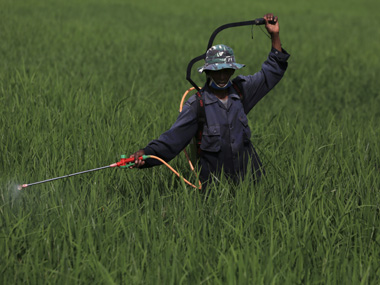With a large section of the farming community being poor and illiterate, it is far easy to palm off spurious and non-genuine pesticides to them. The current market of non-genuine pesticide is at a whopping Rs 3,200 crore ($525 mn) constituting 25 percent by value and 30 percent by volume of the total domestic market of agro chemicals in India. This was one of the findings of a study on Sub-Standard, Spurious/Counterfeit Pesticides in India released by Tata Strategic Management Group, as part of FICCI’s policy advocacy paper.
That spurious pesticides are flowing in the market is not news. But the damage that it wrecks is gaining momentum.
The issue to ponder over is how big is this menace, said Manish Panchal, Practice Head - Chemical, Tata Strategic Management Group. The figures pegged to the counterfeit pesticides market fluctuates wildly between Rs 2,000 crore to Rs 20,000 crore. “Everyone has a different perspective as they work in silos,” said Panchal.
What the study revealed is that of all the players in the value chain, it is at the distribution level that the discrepancies creep in. Usually, a better claimed product is sold by what is known as backyard players, who make the product in garages or in the backyard and sell it at stores that sell the genuine product. The copy-cats often fool gullible farmers by selling counterfeit products identical to the original in colour, shape of container and worse, sell it off at the same price and most often, at prices lesser than the original making it a tempting proposition.
“We found that most pesticides are substituted at the retail outlets. When a farmer comes there to buy the pesticide he wants and has used, he is told that there is one which is better and costs less,” explained Panchal.
The sale of spurious and counterfeit pesticides translates to high margins of 25-30 percent to dealers. This being a lucrative proposition, dealers give shelf space to spurious products among genuine products thus hoodwinking customers.
Implications
Not all counterfeit products are genuinely fake. Some are diluted versions of the original. What are the impact of the use of these pesticides on farms? What happens to the crops, the ground water levels, soil quality besides the health of the farmers when diluted pesticides are used?
Apart from obvious health impact, the farmer suffers economically because even though the non-genuine pesticides cost less at the time of purchase, the overall price paid by the farmer for these products in the entire season is more. This is primarily because of higher dosage requirements and more frequent applications compared to a genuine pesticide.
The yield of the farm can reduce to more than half to nil because of the use of non-genuine pesticides and the farmer is oblivious to the reasons of crop loss due to dependence on environmental factors. Since there are no antidotes available for farms, usage of non-genuine products can destroy fields and completely wipe out harvests. In case of large-scale destruction, it could lead to poverty and social unrest in the rural sector, the study revealed.
The negative impact of usage of spurious and counterfeit pesticides encompasses every section of society right from the farmer who uses it.
The crop protection industry faces loss of sales, patent and trademark infringement, damage to reputation and problems in stewardship activities. Due to the presence of ’look alike’ and ’exact copies’ the farmer loses faith in honest companies and, the industry loses customer trust.
Non-genuine pesticides can also cause resistance in pests and hence, the manufacturers have to come up with a newer technology to replace the old product. New pesticide production takes a lot of time. Not only is it a time-consuming affair, but the new pesticides that are made will be more expensive than earlier products. Many smaller indigenous companies may lose exports in case the image of Indian pesticide exports gets tarnished abroad, the study observed.
The government loses taxes – 12 percent excise, 5 percent VAT – on account of the spurious pesticides market. Additionally, these products pose a risk to current production of 29 million ton of food grains worth Rs 1, 57,794 crore. In 2013-14, India exported 3 million tons of fruits and vegetables worth Rs 8,800 crore ($1.43 billion), and in case the export consignments gets caught in countries, this export too is in danger.
This also affects public health for non-genuine pesticides in the food chain, either directly from the crop or via livestock feeding on the crops and later consumed by humans as meat, can cause serious health problems.
The study warned that if the menace is not controlled, there can be large-scale wastage or prohibition of consumption of food grains due to which consumers might face large scale price fluctuations.


)




)
)
)
)
)
)
)
)